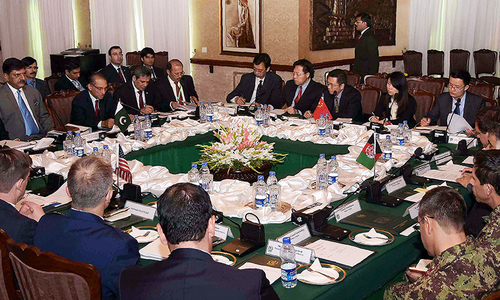
WASHINGTON: A US air strike has killed Afghan Taliban leader Mullah Akhtar Mansour in a remote area along the Pak-Afghan border, the Pentagon announced late on Saturday night.
“Today, the US Department of Defence conducted a precision air strike, targeting Mullah Mansour in a remote area in the Pakistan-Afghan border region,” said Pentagon Press Secretary Peter Cook.
He said the president of the United States had authorised the air strike and that Pakistan and Afghanistan were both notified of it.
“Mullah Mansour was the leader of the Afghan Taliban and presented a continuing threat to our personnel in Afghanistan and to Afghan civilians, Afghan security forces and coalition members across Afghanistan.”
Mansour was prohibiting Taliban leaders from participating in peace talks, claims Pentagon
The US official noted that Mullah Mansour was an obstacle to reconciliation between the Afghan government and the Taliban and was prohibiting the Taliban leaders from participating in peace talks with the government that could lead to an end to the Afghan conflict.
The Pentagon said that since the death of Mullah Omar and Mullah Mansour’s assumption of leadership, the Taliban had conducted many attacks that resulted in the deaths of thousands of Afghan civilians and security forces as well as numerous US and coalition personnel.
“We are still assessing the results of the strike and will provide more information as it becomes available,” Mr Cook added.
Diplomatic sources in Washington said that Mullah Mansour’s death would not cause any major concerns in Pakistan’s power circles.
The sources claimed that Mullah Mansour had some ties with the Pakistanis in the past but relations became strained after he became leader of the Afghan Taliban. Pakistan made several attempts in the recent past to persuade him to join the reconciliation talks but he refused.
Diplomatic observers in Washington, however, said that Mullah Mansour’s death would further fragment the Taliban movement, which split into several factions after Mullah Omar’s death.
“His death will have both negative and positive consequences,” said one diplomatic source. “Sometimes, it is easier to deal with a unified leadership and sometimes a weakened leadership is better. We have to wait and see how this unfolds.”
Published in Dawn, May 22nd, 2016













































